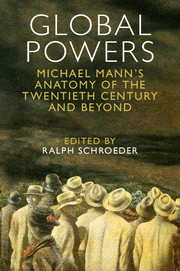Book contents
- Frontmatter
- Contents
- List of contributors
- 1 Introduction
- Part I Theory and history
- 2 The evolution of the sources of social power, and some extensions
- 3 The return of big historical sociology
- 4 Taming the chief: from evolutionary theory to political ideology
- Part II Political, economic, military and ideological questions
- Part III American exceptionalism
- Part IV Empire
- Part V Response
- Index
- References
3 - The return of big historical sociology
from Part I - Theory and history
Published online by Cambridge University Press: 05 April 2016
- Frontmatter
- Contents
- List of contributors
- 1 Introduction
- Part I Theory and history
- 2 The evolution of the sources of social power, and some extensions
- 3 The return of big historical sociology
- 4 Taming the chief: from evolutionary theory to political ideology
- Part II Political, economic, military and ideological questions
- Part III American exceptionalism
- Part IV Empire
- Part V Response
- Index
- References
Summary
Introduction
The publication of Michael Mann's two recent volumes in his The Sources of Social Power (Mann 1986–2013; henceforth Sources) after a gap of more than two decades gives a welcome boost to the practice of large-scale comparative historical sociology. Immanuel Wallerstein's world-system series (Wallerstein 1974–2011) also burst back into life recently after a similarly extended hibernation.
Three decades ago when I published The Rise of Historical Sociology (Smith 1991) ‘big’ historical sociology was a crowded field. Its leading figures included, for example, Charles Tilly, Perry Anderson, Gary Runciman, Theda Skocpol, Anthony Giddens, Barrington Moore, Eric Hobsbawm, Michael Burawoy, and Immanuel Wallerstein, while the memory of Fernand Braudel, recently deceased, lived on in the centre at Binghampton University, and the work of Norbert Elias, still alive and writing in his nineties, was being introduced to a new young audience.
In fact, despite fluctuations, the flow of work has never stopped, and it has been enriched by the recent output of (for example) Christopher Bayley, Jürgen Osterhammel, Victor Lieberman, Dominic Lieven and Geoffrey Parker. However, the completion of Mann's project is especially welcome because of the great scope and strenuous austerity of his approach, which reminds me of the combination of intellectual ambition and self-contained independence of mind that Barrington Moore provided in his books. Like Moore, Mann is neither a disciple nor a guru and is not propagating a specific grand theory of the world.
Mann's four volumes are so full of closely worked empirical analysis that it will take a long time to absorb them fully and respond adequately. However, I begin with a highly preliminary assessment. Then I ask how Mann and his work fit in to the broader field of historical sociology. Pursuing that issue, I return to a discussion I began in The Rise of Historical Sociology and especially to two suggestions I made. The first was that the approaches taken by writers in this field might be influenced, although not ‘determined’, by whether they came from the ‘insider’ or ‘outsider’ position in terms of their social origins. The second was that distinctions might be drawn between four approaches to historical sociology: those of, respectively, the advocate, the scientist, the partisan expert witness and the examining magistrate. At this point, I will contrast Mann with other writers, notably Immanuel Wallerstein and Gary Runciman. Michael Burawoy also makes an appearance in the argument.
- Type
- Chapter
- Information
- Global PowersMichael Mann's Anatomy of the Twentieth Century and Beyond, pp. 38 - 61Publisher: Cambridge University PressPrint publication year: 2016
References
- 2
- Cited by



